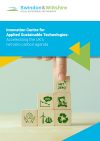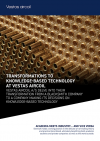On International #WomenInSTEM day 2019, four women in the technology industry told us about their jobs, their passions and their experiences in the industry
When it comes to gender equality in Science Technology Engineering and Mathematics (STEM), the UK is still far behind where we need to be.
However, by increasing media representation of women in STEM, it is possible to challenge the misconceptions and open up the field of technology as a possibility for women and girls.
There are a number of companies and professionals who are moving the needle and making incredible contributions to the industry. This includes UK technology company, Civica which provides IT-based services and currently has a female employment ratio at manager level of 40%.
1. Laura Soutar, Software Engineer, Civica Digital
“To encourage more girls and women into further STEM education and careers, we need to be empowering them to have the courage to follow their passions and start looking beyond the traditional routes of gaining employment.
“After running my own retail business for just under 10 years, I found myself in my 30s needing to figure out what I wanted to do next. The idea of building and creating software had always piqued my interest, so I decided to use my free time to study the basics of coding and building using free online resources. I needed an opportunity that would allow me to work in tech whist studying so I started an apprenticeship scheme run by Belfast Metropolitan College. I wasn’t a stereotypical apprentice, and my route into the technology industry wasn’t the traditional path, but I think that signifies the magnitude of opportunities for everyone, including women.
I decided to use my free time to study the basics of coding and building using free online resources
“An important part of increasing diversity is ensuring the underrepresented groups are shown from a very young age that it is a possibility and that is reinforced throughout school and home. We have both a social and economic responsibility, which needs support from tech companies. For example, at Civica, we run a schools’ outreach programme called ‘Coding For Kids’, where we take the tech to local schools, set challenges and support and mentor young people to be creative with solutions and introduce them to the basic principles of the IT sector.
“It’s about empowering people to have the courage to follow their passions and offering non-standard routes into the industry is a huge opportunity to increase diversity. I am living proof that you do not need to follow a traditional route to be an effective asset to any company.”
2. Judith Owens, Developer, Civica Digital
“To put it bluntly, I’m a nerd and a crafter. I code as a hobby – I get a sense of satisfaction out of making things for people, and unlike more physical forms of crafting, it’s a lot easier to fix code when things don’t go entirely to plan.
To put it bluntly, I’m a nerd and a crafter. I code as a hobby
“Whilst at University, I intended to take the PhD route – I studied Physics at the University of Bath, a full-on undergraduate masters with a year working at the European Synchrotron Radiation Facility in Grenoble – but soon realised I wanted to put my knowledge to practical rather than theoretical use.
“In my experience, women do tend to have a much more collaborative outlook on life – and that’s a key skill for good science and good code development! We also make up roughly 50% of the population, so if we’re discouraged from STEM industries, consider how many different perspectives get excluded.
“To help encourage more women into the science and tech industries, we should highlight more women in the media and education system so that they can act as role models and mentors to young women and girls looking to pursue maths and sciences. And although we’re already heading in the right direction on areas like maternity leave, we still need to bring paternity benefits up to scratch so it’s not a financial necessity for women to have to drop out of STEM to have a family if they want one. We may not be where we should just yet, but I think we’re certainly moving in the right direction.”
we should highlight more women in the media and education system so that they can act as role models
3. Amy Cox, Software Engineer, Civica
“I’ve been working as a software engineer for almost four years now. However, what surprised me most was how tough it was to get into the industry, despite my strong STEM background. I studied maths and meteorology at university and completed several computer science modules as part of my degree. This kick started my passion for computing and technology and started me on the path to a tech career.
“However, despite my strong background in maths, many firms required a specific computer science degree or previous work experience in the area. At a time when technology roles are hard to fill, and the tech skills gap is growing, I feel companies should think more widely about interviewing people with broader STEM skills.
“What attracted me to my current role at Civica is that it focused on learning on the job, upskilling me as I gained experience. They spotted my aptitude, willingness to learn and my potential, not just what was written on paper. Based on my experiences, I can’t stress enough the need for tech advocates, whether from industry or government, to get into the classroom and discuss the huge breadth of careers open to women in the tech industry. We need to get girls’ buy in before they even choose their GSCEs. We need to show girls and women that they can create the next breakthrough app or social media platform.
“The world we live in is diverse, and the tech industry needs to match this, otherwise how can we build and develop products that meet the requirements of the public today and in the future?”
We need to show girls and women that they can create the next breakthrough app or social media platform.
4. Bola Adekoya, Senior Delivery Engineer, Civica Digital
“I’ve always been fascinated by the digital sector, and its continuous evolution and fast-paced nature. I knew I wanted to work in IT since I went to University and having studied computer science and then gone on to do a masters specialising in computer science and applications at Warwick University, it was a natural step for me.
“I think sometimes there’s a perception that my job involves sitting in front of a computer all day long, but my role is unbelievably varied. Since joining Civica, I’ve worked on multiple projects with different teams, a diverse range of clients and using different types of technologies and applications. For example, I could be spending time with the customer analysing their needs, designing user-friendly interfaces and developing applications, for which I’m designing the user interface structure.
Given the gender imbalance across the industry, I think it’s key that companies employ a mentorship scheme to encourage women starting out in their career – this is something I lacked early on in my career and it certainly would have helped me. Instead, I grew in confidence by developing my knowledge and expanding my expertise, I read constantly and always looked to learn about new areas of tech. For me, this is the only way to stay ahead in such a fast-paced industry. I also did my SCRUM Master certificate, fitting it in around my working hours and took a project management course to develop my management skills, so that I could eventually manage my own teams.
Given the gender imbalance across the industry, I think it’s key that companies employ a mentorship scheme
“Whilst there’s still huge discrepancy in the number of men and women in this industry, I do think things are starting to change – I’m seeing huge progression here at Civica where there’s a whole host of training and opportunities on offer to women to help develop their careers. My advice to women and girls looking to pursue a STEM career is to take all opportunities they’re given, and to look for opportunities outside of work or education to develop their skills and knowledge. There’s a plethora of information, events and free conferences (many aimed exclusively at women) out there – so don’t be afraid to get involved!”
Here are some examples of how others are spreading #WomenInStem2019 awareness and support, specifically in the tech world:
“For the women in technology, the future is here. Let’s grab it and run with it.” – Sylvia Makario, Mastercard Foundation Scholar and graduate from Carnegie Mellon University Africa. https://t.co/cVF9XDTCzC#WomenInScience #GirlsinScience4SDGs @WomenScienceDay pic.twitter.com/CKwqXvrb0p
— MastercardFoundation (@MastercardFdn) February 11, 2019
Attending the “Women in Technology” Advanced Manufacturing workshop at Housatonic Community College today! pic.twitter.com/maG2QmDJ27
— DHSCounselors (@DreamBigDHS) February 8, 2019
At our Women in Technology North America VP Leadership Conference, our future #tech leaders applied the principles of #Agile development by building a town out of Legos in three seven-minute sprints. #WomenInTech pic.twitter.com/z5EG87fpUW
— Morgan Stanley (@MorganStanley) February 4, 2019
Katherine Johnson, a mathematician @NASA who helped send our astronauts to the moon, is a great example of how our #federalworkforce drives innovation in society #AAHM #womenintechnology #STEM @USOPM pic.twitter.com/ccPtUvVNzm
— Margaret Weichert (@Weichert45) February 6, 2019






























